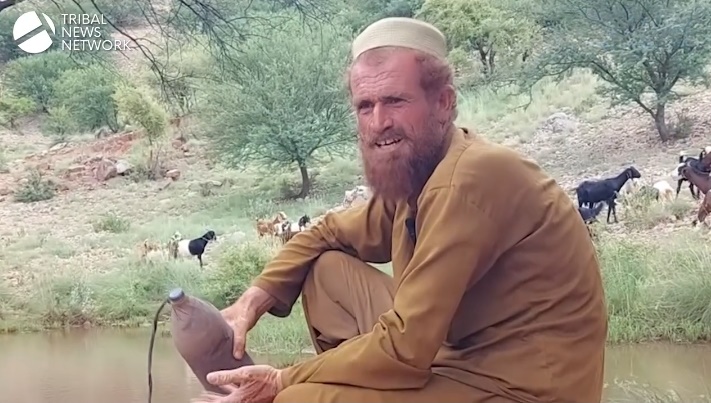
While most people discard plastic bottles after use, 45-year-old Abdul Rauf Khan, an Afghan resident of Chichana, Kohat, uses the same plastic bottle for up to a year. Abdul Rauf, originally from Paktia province in Afghanistan, migrated to Pakistan 40 years ago. He attended school until the eighth grade but had to quit due to financial constraints and began working at a crushing plant with his elder brother.
Speaking to TNN, Abdul Rauf shared that he has been herding goats in the mountains of Kohat for the past four years, a job he finds fulfilling. "This area of Kohat faces a water shortage. The villagers have built small ponds to collect rainwater, which we use for drinking and household purposes. However, during dry periods, these ponds dry up, and we have to arrange for water from distant places, which is very challenging," he explained.
Abdul Rauf described his routine: "I leave home at 7 a.m. with my goats and head to the mountains. In the past, I used to carry cold water in a regular bottle, but it would heat up after a short walk, forcing me to drink warm water."
Also Read: Khyber Pakhtunkhwa's First Modern Police Facilitation Center Inaugurated in Charsadda
To solve this, he came up with an idea. He wrapped the plastic bottle in various layers of cloth, which made it heavier but kept the water cool for several hours. "Now, this bottle is a lifesaver during my long days of herding from 7 a.m. to 5 p.m., especially when I'm exhausted and thirsty," he added.
Dr. Habib Jan, Deputy Director of the Environmental Protection Agency in Peshawar, informed TNN that the production of plastic through fossil fuels releases harmful substances into the environment. "Plastics contain toxic chemicals that pose a threat to our natural ecosystems and human health. Plastic items not only pollute water, soil, and air, but they also contaminate our food supply, leading to various diseases," Dr. Jan stated.
According to Dr. Jan, over 4 to 5 million tons of plastic waste are generated in Pakistan each year, and if no action is taken, this figure is projected to reach 12 million tons annually by 2040. He warned that this would cause severe damage to both the environment and public health. On a global scale, countries have agreed to reduce plastic pollution, and Pakistan has introduced legislation to ban certain types of plastics. However, there has been limited success in completely phasing out plastic in favor of organic alternatives.
Dr. Jan emphasized that plastic bottles take 500 to 1,000 years to decompose. "There are currently around 8 billion tons of plastic in the world, with about 50% ending up in landfills, while 19% is recycled. In Pakistan, plastic is often seen as convenient, but it is a major environmental hazard," he added.
To address the problem of plastic pollution, Dr. Habib Jan suggested the production of biodegradable plastics, which decompose quickly when exposed to the environment. "The concept of bioplastics is gaining traction worldwide to prevent plastic pollution. Several international companies are working on producing plastic from materials like starch, algae, and even mushrooms," he said. These innovations, along with research from academia, aim to tackle the global plastic crisis.
In some countries, plastic is being made from fish scales, and this process is already in practice in certain developed nations. "The advantage of these bioplastics is that they decompose rapidly after use, reducing environmental damage," he explained.
Dr. Jan also noted that polythene bags not only harm the environment but also pose health risks, contributing to various diseases. He mentioned that Pakistan is making progress in promoting glass bottles as a substitute for plastic ones. Some hotels in Islamabad have already adopted this eco-friendly alternative, which is also common in developed countries.
Pakistan is partnering with the World Economic Forum in the fight against plastic pollution. In February 2022, Pakistan joined the Global Plastic Action Partnership (GPAP) in Geneva, Switzerland, aiming to eliminate plastic waste and reach a legally binding international agreement by 2024.